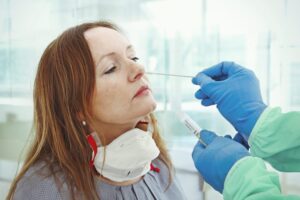
COVID-19 rapid antigen tests are not limited to those who are exhibiting symptoms. Nowadays, whether you travel, attend a live performance, or go to work, you may be obliged to provide a negative COVID-19 test result. Therefore, if you haven’t been tested yet, COVID-19 rapid antigen tests are very certainly in your future — not necessarily to determine if you’re ill, but rather to demonstrate that you’re not.
You may be wondering what the distinctions between the COVID-19 exam kinds are. Which tests are possible to do at home? What documents are need for overseas travel? What is the sensitivity of COVID-19 swab rapid antigen tests for suspected infection? We address these and other concerns below.
When to do COVID-19 rapid antigen tests
Getting tested helps restrict the spread of COVID-19 since it may help determine whether or not you have the coronavirus, even if you do not exhibit symptoms.
Often, individuals are unaware they are ill. This is particularly significant if you get breakthrough COVID-19 infection after immunization. While you may have a minor case, you run the risk of spreading it to those who lack enough protection against COVID-19.
The following scenarios may necessitate the administration of a COVID-19 rapid antigen tests:
- If you believe you may be infected with COVID-19
- Whether you exhibit symptoms of COVID-19, a COVID-19 test may help you evaluate if you are safe to be around people or if you need treatment for COVID-19 or another infection. For instance, if your test results are negative, you’ll know if your symptoms are being caused by a cold, the flu, strep, or another sickness.
- If you do not want to test, you should self-quarantine for a minimum of ten days.
- If you’ve been in the company of folks who have COVID-19
- If you have had close contact with someone who has COVID-19, you should be tested two to three days later, even if you are not exhibiting symptoms.
- If you are not yet vaccinated, you may choose to be tested after spending time in public areas with a high concentration of individuals. Consider rapid antigen tests after attending a crowded concert or movie theater, particularly if no masks or social distancing were used.

Prior to congregating with groups of individuals, it may be prudent to test before to congregating with others during COVID-19, particularly if you will be among elderly folks, sick individuals, or those who are not vaccinated. This is true even if you have been vaccinated, since you may have a minor case of COVID-19 and be unaware of it. Learn more about Covid-19 Stats at https://www.health.gov.au/health-alerts/covid-19/case-numbers-and-statistics
When travel, job, or other situations necessitate it
Depending on the facility, confirmation of immunization and/or a negative COVID-19 test may be required. Rapid antigen tests are required in a variety of situations, including the
following:
- Businesses require periodic testing of unvaccinated employees
- The majority of foreign countries require COVID-19 rapid antigen tests prior to travel, even if you are vaccinated
- Entertainment venues require a negative COVID-19 test in order to attend events.
Whether you experience persistent long-haul symptoms, there is also a COVID-19 antibody (serology) rapid antigen tests that can identify if you have ever had COVID-19. Therefore, if you are having symptoms consistent with long-haul COVID-19, rapid antigen tests may be utilized to ascertain the source of your symptoms.
Testing for active COVID-19 infection using viruses
There are many COVID-19 viral tests available that screen for current infection. Each sort of exam has its advantages and downsides.
It is as follows: A polymerase chain reaction (PCR) rapid antigen tests for COVID-19 is a molecular test that searches for genetic material associated with the disease. Due to its great accuracy, it is the gold standard rapid antigen tests and the most accurate technique to determine whether someone is sick.
PCR tests need specialized equipment and highly trained specialists to conduct. This implies that it may take up to five days to get results – but it is often quicker if the test is performed in a health center rather than using an at-home kit.
How it is accomplished: Typically, a swab is put into the nose or mouth to get a direct sample of mucus from the nasopharynx, the section of the upper respiratory system behind the nose and in the throat. Occasionally, PCR rapid antigen tests will instead utilize a sample of your saliva.
PCR tests check for the virus’s RNA, or genetic code. Your sample is amplified throughout the rapid antigen tests, which enables detection of even the tiniest quantity of coronavirus.
How to get a test: In most circumstances, scheduling a COVID-19 rapid antigen tests at a health care institution is the fastest method to get your findings. If you want the findings immediately – for example, if you are traveling – it is recommended that you get your COVID-19 test in person.
There are at-home tests available, however they may take longer to complete since they must be sent in.
However, if you prefer self-testing, Minnesota, Wisconsin, and Iowa provide free COVID-19 PCR tests. Additionally, PCR tests are available through internet sellers and select retail locations.
How will you get your results: If you are tested in a clinic, you will get your COVID-19 rapid antigen tests results in the same manner as other lab results. If you are using an at-home kit, contact the manufacturer for further information on how results are reported.
COVID-19 infection testing in the past
Without receiving a COVID-19 rapid antigen tests, it is possible to contract COVID-19 and recover. Perhaps your case was light, or you had no symptoms at all. Or maybe you were aware that you were ill but were unsure if you were suffering from the flu or COVID-19 symptoms.
In the majority of situations, it is unnecessary to determine if you have recovered from COVID-19. The exception is if a preexisting infection may have an effect on your subsequent treatment. Thus, your doctor may offer this test if you have long-term COVID symptoms or if you need a medical treatment and have previously tested positive for COVID-19.
Antibodies against COVID-19 (serology)
What exactly is it: The purpose of this rapid antigen tests is to detect antibodies produced by the immune system in reaction to COVID-19. Antibodies suggest that your immune system has reacted to the sickness, indicating that you have had COVID-19 before. These antibodies develop around 20 days after the first infection — it is possible to have a false negative if you test less than three weeks after contracting COVID-19.
How it is accomplished: A blood sample is obtained by a finger prick or a vein puncture. Your doctor will be able to determine whether you have COVID-19 antibodies in your blood when it is processed.
How to get a test: Consult your primary care physician to determine if you should have a COVID-19 antibody rapid antigen tests.
How will you get your results: You will get your COVID-19 antibody test results in the same manner as you would receive any other laboratory findings.

